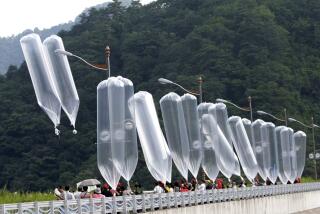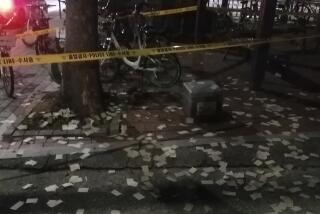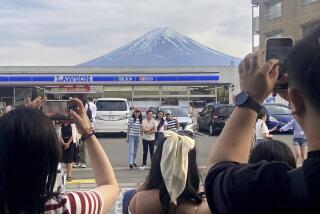North Korea Touts Fun and Games to Lure Japanese Tourists
TOKYO — Japan got a taste of North Korean marketing Wednesday when the isolated Communist state kicked off a publicity campaign designed to lure tourists to its two-month “Arirang” festival.
In a rare opening to outsiders by the Stalinist state, North Korea hopes that thousands of foreign visitors will come to watch mass sports and arts spectacles that start in late April in honor of the state’s late founder and his son, its current leader.
Apparently hoping to make the karaoke-loving Japanese feel right at home, the head of the North Korean tourist delegation burst into song in the middle of a packed news conference here--and didn’t stop for more than 10 minutes as he ran through several regional versions of the Arirang theme song.
The performance prompted a quick look of amused surprise from one of his North Korean colleagues, a show of emotion soon replaced by the stony pose maintained throughout the rest of the two-hour gathering.
The North Koreans also treated the 70 or so assembled reporters and travel agents to a propaganda video showing children running toward flowers in slow motion, North Korea’s relatively empty roads and skyscrapers, and Caucasian visitors eating noodles and dancing as other visitors play golf.
“The video was only five minutes,” said Jun Miyagawa, a part-time Japan representative for the festival, whose day job is selling socialist books. “If you want, we can see it again.”
His opening was met with deafening silence, prompting him to return to description of the wonders of the wondrous mass spectacles.
Miyagawa’s enthusiasm contrasted sharply with the North Korean officials--songs and smirks aside--who appeared halfhearted at best over the prospect of so many visitors descending on their country.
Officials Refuse to Answer Questions
In response to a series of questions about whether Japanese journalists would be allowed in, how many visitors they expect, whether Japanese of Korean descent would receive visas and whether North Korea was now making nice after recent charges of sending a spy ship into Japan’s neighboring waters, the officials sidestepped, deflected or otherwise issued the North Korean equivalent of “no comment.”
“Even if you keep asking me the same question, you’re not going to get any further information,” said Hwang Pong Hyok, director of promotion for North Korea’s National Tourist Administration.
The festival, designed to glorify North Korea’s leadership, is named after the popular and catchy Korean “Arirang” song written in the late 19th century.
Whether this Communist marketing can pull in good capitalist moola remains to be seen. Japan and North Korea have no diplomatic relations or direct airline connections, so Japanese visitors would have to go through Beijing, Vladivostok or even Moscow, many a time zone away. Japanese tourists also tend to have a relatively low tolerance for risk, and they’re only just returning to perceived safe overseas destinations such as Australia or China after the Sept. 11 attacks.
“I don’t think it will be an easy sell given North Korea’s notoriety as an ‘axis of evil’ country,” said Hiroshi Ueno, an official with the Japan Travel Bureau, referring to President Bush’s recent comments. “Most people probably won’t see this as a particularly relaxing vacation destination.”
North Korean officials said they’re hoping for 5,000 Japanese but would be happy with 1,000. The price of accommodations in Pyongyang, the North Korean capital, is cheap “by international standards,” they added. The all-inclusive packages are expected to cost about $500 per day.
If North Korea really wants to build a following among Japanese tourists, it will need patience and a basic understanding of free-market principles, said Toshiko Kato, a spokeswoman with the Japan Assn. of Tour Agencies. Vietnam, Cambodia and China worked for years to build up their tourist industries through hard work and improved infrastructure--including better toilets, Kato said.
“Just because they arrive today,” she said, “they can’t expect flowers to bloom tomorrow.”
Japanese tour agencies also risk getting caught in the industry equivalent of the demilitarized zone, said Ryoichi Morotome, a spokesman with Kinki Japan Tourist agency. “Even if the trips sell well, South Korean agencies could threaten to cut us out of their market unless we stop selling North Korean tours,” he said.
North Korea experts say the North’s motivation in opening its festivals to foreign visitors is pride and profits. Pyongyang is wary of South Korea getting all the attention when it co-hosts soccer’s World Cup this year with Japan, they say. And the cash-starved nation badly needs hard currency.
“But mass games aren’t a productive activity,” said Tsutomu Nishioka, an analyst with Japan’s Modern Korea Research Institute. “The 100,000 North Koreans should really be out in the paddies planting rice.”
One of the reasons North Korea apparently prefers Japanese tourists is because they’re seen as relatively well-behaved and less likely to embarrass the tightfisted regime.
Americans aren’t generally welcome, nor are South Koreans, given the usually frosty relations between Pyongyang and their capitals.
“I think they’re targeting us because we have a reputation for all doing the same thing at the same time once a trend gets started,” said Junko Yoshida, an official with the HIS Travel agency.
But Japanese tourists on a similar trip several years ago bridled under all the restrictions and the lack of contact with the locals, tour official Kato said. “People from a free country are used to doing things they want to do,” she said. “If they have a lot of restrictions again, it could be a problem.”
Tourist Recalls Surprises From Past Visits
One Japanese tourist, who visited North Korea in 1991 and 2001 and asked not to be identified given his desire to return, said many visitors may be pleasantly surprised by their reception. He says he found many of the guides on his most recent trip quite sophisticated, to the point where he believes they were even schooled in telling Japanese jokes.
They also learn fast, he says. His North Korean guides took videotapes, quickly edited them and sold them to the tourists for $40 per tape. They also used them for their own propaganda purposes. Shots of Japanese applauding mass spectacles were spliced with images of North Korean head Kim Jong Il beneath headlines about how impressed foreign visitors were with the country’s leadership. “A lot of Japanese will be tricked into this sort of thing, I’m 120% sure,” he said.
A brochure provided by the North Koreans lists three tour options. The highlight for each is the Arirang festival. “It’s very mysterious,” Hwang promised, “and beyond your wildest dreams.”
Rie Sasaki in The Times’ Tokyo Bureau contributed to this report.
More to Read
Sign up for The Wild
We’ll help you find the best places to hike, bike and run, as well as the perfect silent spots for meditation and yoga.
You may occasionally receive promotional content from the Los Angeles Times.






